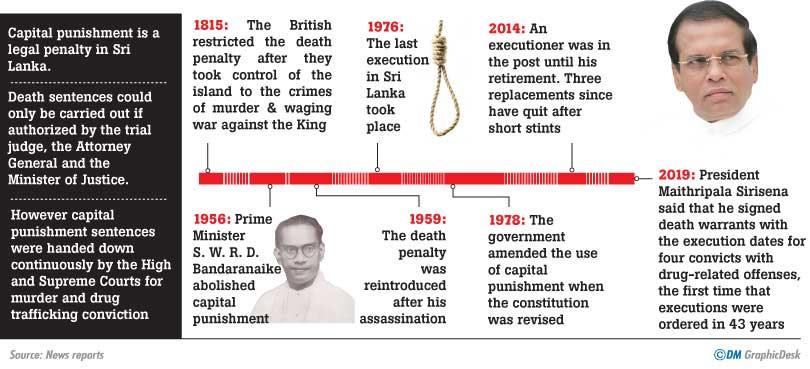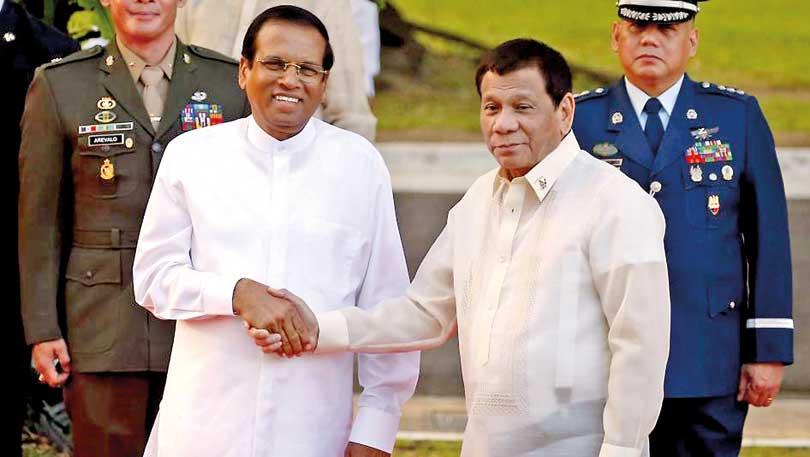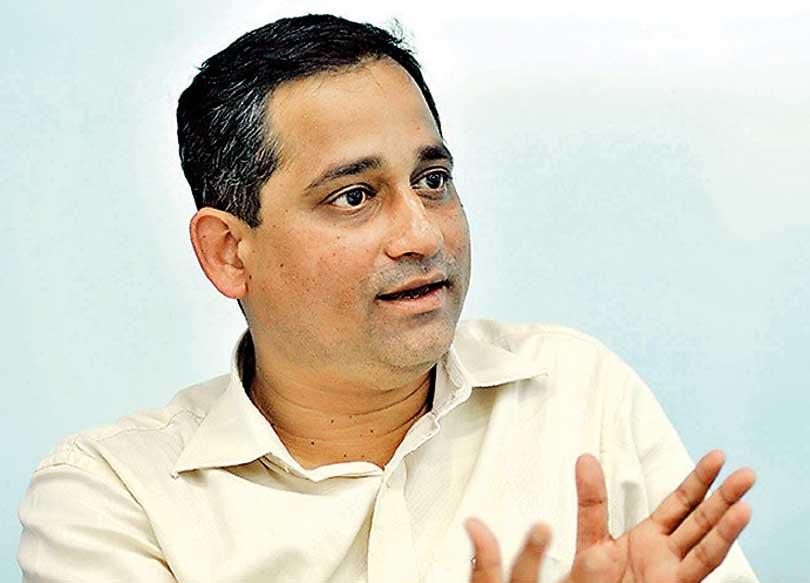Reply To:
Name - Reply Comment
Last Updated : 2024-04-25 05:35:00
 The death penalty or Capital punishment or judicial hanging or sending to the “Gallows” is the killing of a person by legal statute. In this situation the head of state is literally the executioner as he gives the final order for execution, including the date, time and the place of execution. Thus the state legalizes, solemnizes and sanctifies the act of termination of a human life.
The death penalty or Capital punishment or judicial hanging or sending to the “Gallows” is the killing of a person by legal statute. In this situation the head of state is literally the executioner as he gives the final order for execution, including the date, time and the place of execution. Thus the state legalizes, solemnizes and sanctifies the act of termination of a human life.
In Sri Lanka offences for which the death penalty is applicable include.1
(a) Murder and conspiracy to murder
(b) Abetting suicide when such person commits suicide.
(c) Possession of 2g of heroin or more
Several other offenses for which the death penalty is applicable in other countries are not applicable in Sri Lanka.
Hanging by the neck is the only mechanism used to cause death in the judicial setting in Sri Lanka as proclaimed by the British after they took control of the island in 1815.
The death penalty which may be implemented by “hanging” or any other means amply describes and explains the cruelty of the death sentence. Amnesty international in 1990 described the death penalty as “cruel, inhuman and degrading”. There is mental torture for the person sentenced to death for several days, weeks or months before the date of execution. Further there is physical torture during execution. What about the mental torture afflicted on the next of kin, mainly the innocent wife, children, parents, many of who become destitute. Does the state who took the life of the prisoner take care of the dependents?
As a judicial medical officer working in the Ministry of Health for 32 years, I have given evidence in several hundreds of murder trials where the accused may very well have been sentenced to death. However, I am much relieved that such death sentences have not been executed.
 Most prosecuting counsel believe that society demands accountability from the state for such terrible crimes and that the murderer when convicted forfeit the right to live in that society. They also believe that the death penalty is the only mechanism to protect innocent human lives from murderers.
Most prosecuting counsel believe that society demands accountability from the state for such terrible crimes and that the murderer when convicted forfeit the right to live in that society. They also believe that the death penalty is the only mechanism to protect innocent human lives from murderers.
Does the prosecution and civil society organisations who clamour for the implementation of the death penalty ever reflect that the murderer is another human being, living in the same society, misguided by that society which nurtured the prosecution and those who demand implementation of the death penalty.
If the prosecuting counsel and convicting judges and civil society organisations ever visit the “Gallows”, to witness an execution and see the pathetic state of a man dead (or at times struggling) I am confident that they will never ever sentence to death a man by hanging but will certainly opt for life imprisonment.
The death penalty as a deterrent to murder has no support, as research carried by states where the death penalty is used as a punishment for murder indicates the negative. Such research carried out mainly in the US where the death penalty is implemented by several methods indicate a much higher murder rate which is further proof that the death penalty is not a deterrent to murder.
The British Commission on Capital Punishment noted that the capital punishment obviously failed as a determent for grave crimes such as murder.
Another argument in favour of the implementation of the death penalty is based on retribution. Here the concept is that evil can be countered by appropriate punishment. But this is not retribution but simply revenge of a highest order like the Biblical saying “Eye for an Eye or a tooth for a tooth”. In the context of the death penalty it simply means life for a life. Such revenge and retaliation for murder cannot be accepted in modern civilized society.
Legal argument for abolition of the death penalty includes:
(a) Most murders are not premeditated and there was no criminal intent.
(b) Erroneous convictions. In other words innocent person have paid with their lives for murders committed by others. Most erroneous convictions are due to mistaken identify and false evidence, where the actual murderer becomes a crown witness and the chief witness for the prosecution.
Even if a single prisoner is executed by an erroneous conviction, that itself is a valid reason for the abolition of the death penalty. Studies in the USA have revealed that the likely number of executions by erroneous judgements are about 4%. It is often stated in legal parlance that it is better to send home 99 murderers than to convict and execute one single innocent man on a charge of murder. How many such innocent persons have been executed to date? Several persons convicted of murder and sentenced to death have been exonerated later on DNA evidence. In Sri Lanka how many murder convicts can have access to DNA technology when they are wrongfully found guilty of murder and sentenced to death? DNA studies have exposed the fallibility of the criminal justice system.
In Sri Lanka, inherent legal defects leading to wrongful convictions for murder include:
(a) Wrongful indictment for murder.
(b) Murder suspect not “adequately” represented by counsel.
(c) Non-representation of accused by lawyers in certain types of murder cases.
(d) Failure of defence counsels and judges to seek second opinions in respect of medical and scientific evidence which is dubious.
(e) Failure to obtain a report from a psychiatrist as to the mental state of the accused at the time of committing the murder.
(f) Judicial errors - all judges are human and are fallible.
(g) Perverted jury verdicts - a divided jury verdict of 5 to 2 where there is a reasonable doubt the verdict is sufficient to sentence a person to death on a murder charge.
Every human being has a right to life, both the victim and the murderer. The death penalty is clearly in violation of the right to life and right to live. The Universal Declaration of Human Rights in 1948, proclaimed that “every individual has a right to life, liberty and security of his person. Amnesty International in 1977 and other civil organisations called for the abolition of the death penalty.
Sri Lanka did not abolish the death penalty but retained the death penalty in its legal statutes. However, Sri Lanka did not carry out the death penalty as a government policy since 1956. The re-implementation of the death sentence in 1961 to punish the three murderers of the then Prime Minister resulted in 89 person being executed by hanging. Subsequently, it was once again not carried out since 1976. Today there are nearly 1000 prisoners on death row in Sri Lanka, awaiting execution. All of them are at the mercy of the executive who decides on the life and death of such convicts. The Morris Commission of Ceylon established in 1958 strongly argued for the abolition of the death penalty as it was totally against the Buddhist tradition of tolerance and compassion.

If the death penalty is to be abolished, there must be an alternative to it. British Governor Sir Joseph West Ridgeway commuting the death sentence to life imprisonment stated “it compels me to remit the extreme death penalty which would close the door for further inquiring and reparation should the doubt be confirmed by future revelation.
In the Roman Treaty of 1998, the international Criminal Court stated that the maximum penalty should be life imprisonment even for the worst crimes against humanity such as gruesome murders, genocide, rape and murder and torture and murder.
Life imprisonment in Sri Lanka means “imprisonment for 20 years with hard labour. However, they can be released by the executive after 20 years or before 20 years. This punishment is not a deterrent to murder. The alternative punishment is imprisonment for life where the convicted prisoner spend the rest of his life in a prison environment without parole. Such convicts can undergo counseling, psychiatric treatment if necessary, be given a suitable education, placed in a religious background of their choice, receive vocational training and thereafter be rehabilitated in an open prison environment. This would be beneficial to the convict, his family and to the country. The 1962 survey in the United Nations also showed that “imprisonment for life” for convicted murderers is sufficient protection for society. Furthermore, those who are convicted but later exonerated may be awarded compensation.
The declaration of the World Medical Association (WMA) in 1977 at Stockholm stated: that the death penalty is the ultimate, cruel, inhuman and degrading punishment for a human being as it violates the right to life and that it is totally and unconditionally opposed to the death penalty and calls upon all governments to bring about the immediate and total abolition of the death penalty.
Implementation of the death penalty is a journey of no return to an innocent man. Universal abolition of the death penalty will be one of the most beautiful victories of humanity.
The author is a retired Chief Consultant and Judicial Medical Officer, Colombo.

President Maithripala Sirisena met his counterpart President Rodrigo Duterte during a state visit to Phillippines earlier this year
 Biraj Patnaik, South Asia Director at Amnesty International (AI), in a final appeal from the international body to Sri Lanka concerning the imminent execution of some prisoners on the death row for drug related crimes/June 25, 2019/www.amnesty.org
Biraj Patnaik, South Asia Director at Amnesty International (AI), in a final appeal from the international body to Sri Lanka concerning the imminent execution of some prisoners on the death row for drug related crimes/June 25, 2019/www.amnesty.org
It is reported that the president has signed the death warrants of some condemned prisoners awaiting execution, having been convicted for drug-related offences, and that all arrangements are now in place for hanging them before the June 21 - July 1 National Drug Eradication Week ends. As that period is drawing to a close, the hangings must be considered imminent. I hope the condemned persons are still alive when you read this (which I am writing on June 28). However, it is not too late for the president to desist from the rash course of action he has decided on.
As AI’s South Asia Director Biraj Patnaik says executions will not rid Sri Lanka of drug-related crime. Patnaik is expressing a commonsense view, which many people share. The damning criticism implicit in the rest of the extract quoted above, though baseless, should not be taken lightly. The president doesn’t seem to have consulted his advisors about the matter (which is a costly waste of resources). Decisions can be retracted if later found to be erroneous, but deaths are not reversible once committed, if it is subsequently discovered that they resulted from a miscarriage of justice. If someone must be executed as a judicial necessity for crimes committed, so be it. But there need not be an unexplained hurry or suddenness in executing them, as in this case there obviously is.
It is true that Sri Lanka has a devastatingly serious drugs problem. It must and can be contained as demonstrated in the past, until total eradication is achieved. The surest way is to enforce the law strictly, rehabilitate addicts and traffickers, break the nexus between politicians and drug dealers, and the rest of a whole host of measures as advocated by relevant experts and law enforcement specialists. It will be a never ending process like normal policing. The president’s avowed commitment to the eradication of the menace is commendable. However, his mission is doomed by what has become the order of the day since 2015: politicizing and personalising all issues from constitution making to crime busting. The current rulers do this for the dual purpose of just staying on in power ignoring the ‘Curses, not loud, but deep’ of the masses that elected them to power, now disillusioned, and of keeping their rivals out of power, or even out of politics if possible. Some reflection will show the impartial observer that little more than that has happened in Sri Lanka since 2015.

Biraj Patnaik
After a visit to the Philippines, where the President met with his counterpart there the formidable Duterte who has adopted some drastic measures to overcome a hopelessly severe domestic drug addiction and trafficking problem in his country with a population of more than 100 million to Sri Lanka’s 21 million, he has decided to take a leaf out of the latter’s book. That won’t do. There are huge differences between the two countries, their people, cultures and especially the personalities of the two leaders. A tiny quail can’t match an elephant in the size of its droppings, as the Sinhala saying goes. However, the most significant difference between the two must be mentioned.
Duterte stood up to the US President when the latter expressed concern about his merciless campaign against the problem that resulted in thousands of summary executions; and he launched his controversial operations without thinking of its political fallout on himself; and the other thing is that Duterte enjoys more recognition than the Sri Lankan President at the UN as a substantially large contributor of funds to the world body. In contrast, the sudden intensification of the fight on the drug menace in Sri Lanka seems to have been motivated by a desire to salvage at least the semblance of credibility that the champion thinks he still has.
But one cannot become a hero by hanging, be it hanging for killing oneself, for carrying out judicial execution or for committing plain murder. But the lame duck President, at the tail end of his disastrous presidency, seems determined to go on with the hangings, come hell or high water, for that ‘heroic’ purpose. And in effect, he will be doing all three in an utterly meaningless ‘suicide hanging’ (on the analogy of suicide bombing), if such a thing is conceivable by any stretch of the imagination. Circumstances, for most of which he must share responsibility with his Yahapalana partners, have paradoxically lulled him into a state of self-hypnosis induced by a Macbethian sense of false security.
There are huge differences between the two countries, their people, cultures and especially the personalities of the two leaders
The sudden ending of the 33-year long moratorium on the death penalty (there hasn’t been an execution since 1976 in Sri Lanka) as a desperate measure is not likely to cause the war on drugs to gain any special traction among the public other than what is already there. The reason is that, although the drug problem is a crucial issue, there are immediately more pressing problems to be addressed before that, such as the problem of threatened national security that came to light with the April 21 Easter Sunday bombings, which, according to opposition politicians, could be a harbinger of worse trouble from geopolitical players in the region.
It will be a more dignified thing for the President to do to listen to the advice of the Ven. Mahanayake Theras of Asgiriya and Malwatte Chapters and that of His Eminence Cardinal Malcolm Ranjith to call off the executions than to seem to accede to the demand of the AI which has always had a jaundiced view of Sri Lanka due to false propaganda to ‘Halt plans for executions, once and for all’. However, though Amnesty International, as a pro-Western organiation, is a biased entity as far as Sr Lanka is concerned, its request on this occasion is not unreasonable.
Andrew Silva Wednesday, 03 July 2019 05:35 AM
Surely Sri Lanka doesent want to go back to the dark ages. We are a civilised society. We have the capacity, resources, intellect and humanity to rehabilitate and correct any individual who has taken the wrong path. Give it a go honourable administrators. Spare the noose.

Add comment
Comments will be edited (grammar, spelling and slang) and authorized at the discretion of Daily Mirror online. The website also has the right not to publish selected comments.
Reply To:
Name - Reply Comment
US authorities are currently reviewing the manifest of every cargo aboard MV
On March 26, a couple arriving from Thailand was arrested with 88 live animal
According to villagers from Naula-Moragolla out of 105 families 80 can afford
Is the situation in Sri Lanka so grim that locals harbour hope that they coul